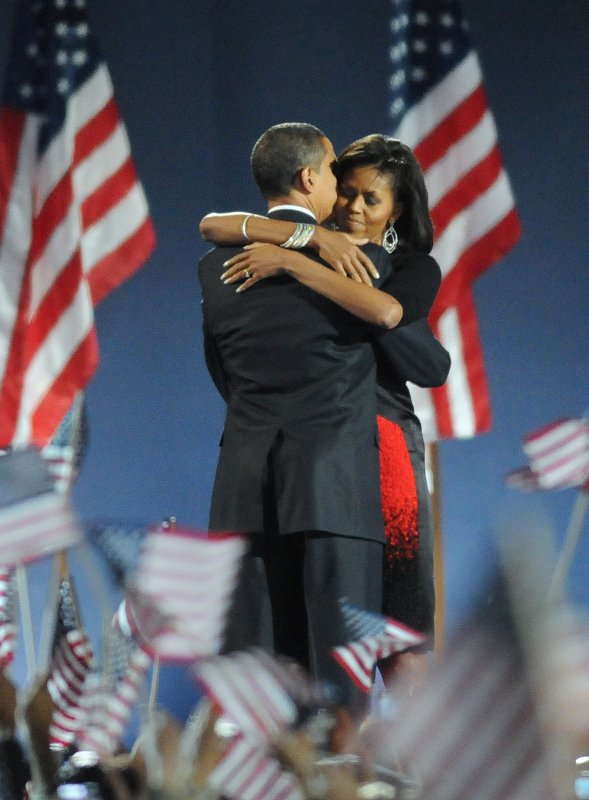1 of 16 | Democratic president elect Senator Barack Obama (D-IL) gets a hug from his wife Michelle Obama after he addressed supporters at a massive outdoor rally in Grant Park in Chicago on November 4, 2008. (UPI Photo/David Banks) |
License Photo
WASHINGTON, Nov. 5 (UPI) -- Sen. Barack Obama won the U.S. presidential election in a historic blowout victory Tuesday.
Obama, D-Ill., won by a 6-point margin in the popular vote, 52 percent to 46 percent, over Sen. John McCain, R-Ariz. He eclipsed President George W. Bush's 2004 record to win more votes than any other individual in American history. Some 62,438,115 people cast their ballots for him.
As we had predicted in UPI Analysis, Obama's margin of victory was far wider than almost all pundits had expected. McCain trailed him by more than 7 million votes. He got only 55,380,169 -- around 6 million less than Bush did in his 2004 re-election win. Obama therefore won a commanding victory margin three and a half times larger than Bush's in 2004.
The Democrats won at least five Senate seats, boosting their total from 49 seats to 54 seats, and they were in contention as of Wednesday morning to win four more. Given the two independent senators who caucus with the Democratic majority in the Senate, that would give them the magic 60 seats out of 100 they would need to cut off any Republican filibuster attempts to block legislation.
In the House of Representatives, the Dems more than doubled their already comfortable 36-seat advantage in the old 110th Congress. It will now be up to 78 seats. The Democrats control 251 seats, with the Republicans, dominant from 1994 to 2006, down to 173 seats.
McCain proved better at losing than campaigning. His concession speech, in contrast to the tone of his later campaign, was gracious. But two issues doomed his hopes: the parlous state of the U.S. economy as it staggers on the brink of recession following the Wall Street meltdown, and the massive burden of following widely discredited President George W. Bush.
Obama ran a wise, shrewd and balanced campaign. It helped, of course, that he was awash with funds -- more so than any previous Democratic candidate in history. And his much derided background as a community organizer in Chicago at the start of his career, coupled with his years in the Illinois State Legislature, proved the essential foundation for his success.
Obama put together arguably the best organized and most efficient national organization the Democratic Party has known since the heyday of President Franklin Roosevelt and his own "Karl Rove," Postmaster General James Farley, in the presidential elections of 1932 and 1936 and the congressional election of 1934.
Obama has now beaten in straight contests two figures who were for decades prominent leaders in their own parties. He beat out Sen. Hillary Clinton, D-N.Y., the first former first lady in history to win a Senate seat, with her $250 million war chest and her super-secure base in New York state. Then he went on to beat McCain, who has served in the Senate for 22 years and was the greatest war hero to take a prominent role in national U.S. politics since John Kennedy and Dwight Eisenhower.
Obama sensibly poured enormous resources into Ohio, Florida, Pennsylvania and Michigan. He succeeded in picking off New Mexico, Colorado, Nevada, Virginia, Iowa and Wisconsin: His broad front but carefully focused campaign, derided by many armchair critics as being too ambitious and diffuse, paid big dividends. It convinced key voter segments in the big Northeast and Midwest industrial swing states and bellwether Florida.
As we had predicted in UPI Analysis, this was no cliffhanger election like 2000, 1976, 1968 or 1960. Obama did not win a record landslide, but he won the most decisive Democratic victory in 44 years since Lyndon Johnson's 1964 landslide over Sen. Barry Goldwater, another Arizona Republican. Goldwater was the prophet of the long era of Republican-conservative domination of U.S. national politics that truly began with Richard Nixon's narrow victory over Hubert Humphrey in 1968. McCain's defeat may prove its death knell.
It was the first time since 1964 that the Democrats won more than 50 percent of the total vote. Virginia, the Old Dominion, went Democrat for the first time since 1964.
Obama was vastly helped in both his primary and presidential campaigns by the many mistakes of his opponents. Clinton picked inept state campaign managers and organization administrators. She ignored caucuses and minor primaries across the United States. She ran one of the most woefully mismanaged campaigns in modern U.S. political history.
McCain sorely lacked the drive, innovation and focus of Karl Rove, who masterminded Bush's 2000 and 2004 campaigns. He looked good on national security, experience and leadership issues until the great Wall Street meltdown, but then he was never convincingly able to articulate any credible responses to it.
McCain's choice of Alaska Gov. Sarah Palin as his vice presidential running mate had mixed results. The Palin pick should be credited with a major role in repelling Obama's anticipated challenge in some Heartland states. But it cost McCain badly among college-educated middle-class swing voters. With the benefit of hindsight, former Massachusetts Gov. Mitt Romney would have been a vastly superior pick to reassure the conservative base and also speak credibly on the economic meltdown. But McCain did not like him.
By contrast, Obama's instinct for continuity and moderation in his own vice presidential choice has already served him well. For all his many well-reported gaffes, veteran Sen. Joe Biden, D-Del., fulfilled his function of bringing massive foreign policy experience and reassuring familiarity and niceness to the Democratic ticket.
Like his hero, President John F. Kennedy, Obama was cool, intellectual and reflective in his political strategizing. If he can maintain those qualities and that outlook in the coming months, he will be off to a good start.
Congratulations, Mr. President-Elect!















